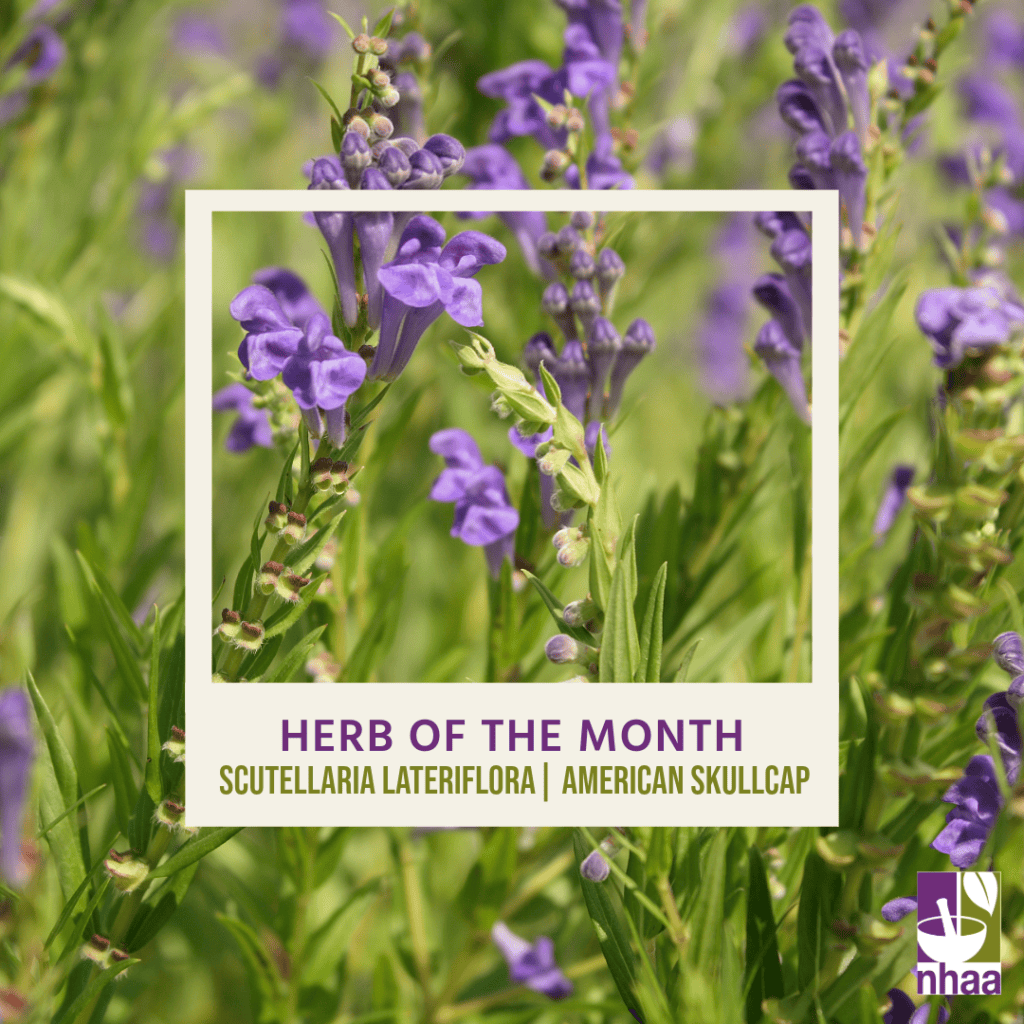
🌿This month’s Herb of the Month is American Skullcap, Blue Skullcap, Skullcap or Scutellaria lateriflora
Family: Lamiaceae
🌿 Botanical name and description
Native to North America, this flowering perennial gets its botanical name, Skullcap, from the species’ unique appearance resembling helmets worn by European soldiers (1). Scutellaria lateriflora (S. lateriflora) generally grows best in full sunlight/partial shade in soil that is well drained with the aerial portion of the herbaceous perennial being used for its therapeutic properties (2). Whilst the wild harvesting of S. lateriflora has been known to occur within North America, the majority of the global market is now supplied by small farms and growers scattered around the world as well as within its native habitat (3).
🌿 History and traditional use:
S. lateriflora has been utilised both traditionally and contemporarily to remedy stress, menstrual health and anxiety (4). Its therapeutic use is over 2 centuries old and historically has been applied in the treatment of digestive disorders and kidney problems, postpartum stimulation of the reproductive system, sore throat, breast and eye pain and in the remedies of fevers and heart conditions by Native American peoples (1,2).
S. lateriflora has also been recorded in the treatment of hysteria, chorea and epilepsy, as an emetic for the expulsion of afterbirth and as a preventative for smallpox in Native American medicine (1, 3).
🌿 Actions and usage today
Contemporarily, S. lateriflora’s therapeutic methods of application are vast with many clinicians prescribing it to patients in the form of extracts, capsules, tinctures and teas (2).
S. lateriflora’s scuterllarin and baicalin flavonoids as well as its phytomelatonin have been found to be responsible for its sedative and nervine effects that pair well with additional herbs exhibiting complementary actions, making it a desirable weapon in a herbalists arsenal (5).
Though S. lateriflora’s modern application is centred predominantly on supporting the central nervous system, sleep deprivation and anxious states, it is also prescribed to help digestive disturbances, remedy inflammatory skin conditions, allergies, hyperlipidaemia, atherosclerosis, post-stroke paralysis and nervous exhaustion (4).
Furthermore, S. lateriflora’s antitumor and anti-cancer activity has been shown to suppress prostate and breast cancer aggregation, minimising endogenous phenomenon associated with metastatic events and decreasing apoptosis via its anti-oxidative actions (2).
Caution has been recommended in the past due to evidence of hepato-toxicity with the use of S. lateriflora, however, further investigation into this caution has demonstrated this is likely due to an adulteration with Teucrium canadensis and Teucrium chamaedrys or pink skullcap, a plant morphologically similar to S. lateriflora and frequently misidentified (1, 2).
Many researchers agree that high quality, formal clinical investigations into S. lateriflora are lacking, leading to adulterations with Teucrium spp. and the subsequent cautions that follow but are not necessarily warranted.
🌿 Science and clinical trials:
Studies comparing flavone profiles within native species of Scutellaria explored the variations of phytochemicals within the plants including baicalein, baicalin, wogonin, wogonoside, scutellrin and apigenin and where such flavonoids may be most abundant (6). These investigations revealed that the dense accumulation of therapeutic components within Scutellaria lateriflora were located in high concentrations within its aerial elements, unlike other species of Scutellaria, indicating an important differentiation within the species and potential reasoning behind variabilities in actions and garnered application (6).
One inquiry showed that when tested on volunteers in a placebo-controlled, double-blind crossover study, S. lateriflora was found to significantly improve mood and minimise anxiety and comorbid depression without affecting cognition or influencing energy (4).
Additional pharmacological research into commercially available herbal products containing S. lateriflora and other Scutellaria spp. therapeutics discovered significant variabilities within phytochemical profiles of products. HPLC analyses comparing seven commercial preparations obtained from five companies discovered significant variations in total flavonoid content with one sample completely devoid of baicalin, baicalein and wogonin (4).
As with many of our herbal heroes, more research and dedicated investigation is required to remove these potentials for adulteration and phytochemical inconsistencies in order to improve quality control and support herbalists in their clinical prescriptions.
🌿 References:
- LiverTox: Clinical and Research Information on DrugInduced Liver Injury [Internet]. Bethesda (MD): National Institute of Diabetes and Digestive and Kidney Diseases; 2012-. Skullcap. [Updated 2020 Mar 28].
- Sherman, Samantha H. and Nirmal Joshee. 2022. “Current status of research on medicinal plant Scutellaria lateriflora: A review.” Journal of Medicinally Active Plants 11, (1):22-38. DOI: https://doi.org/10.7275/shxv-wb39 https://scholarworks.umass.edu/jmap/vol11/iss1/3
- Edwards, S.E., Rocha, I.d.C., Williamson, E.M. and Heinrich, M. (2015). Skullcap. In Phytopharmacy (eds S.E. Edwards, I.d.C. Rocha, E.M. Williamson and M. Heinrich). https://doi.org/10.1002/9781118543436.ch101.
- Brock C, Whitehouse J, Tewfik I, Towell T. American Skullcap (Scutellaria lateriflora): a randomised, double-blind placebo-controlled crossover study of its effects on mood in healthy volunteers. Phytother Res. 2014 May;28(5):692-8. doi: 10.1002/ptr.5044. Epub 2013 Jul 22. PMID: 23878109.
- Thakral N, Konjeti VR, Salama FW. Drug induced autoimmune hepatitis: An unfortunate case of herbal toxicity from Skullcap supplement: A case report. World J Hepatol 2023; 15(12): 1333-1337 [PMID: 38223420 DOI: 10.4254/wjh.v15.i12.1333].
- Costine B, Zhang M, Chhajed S, Pearson B, Chen S, Nadakuduti SS. Exploring native Scutellaria species provides insight into differential accumulation of flavones with medicinal properties. Sci Rep. 2022 Aug 1;12(1):13201. doi: 10.1038/s41598-022-17586-1. PMID: 35915209; PMCID: PMC9343603.